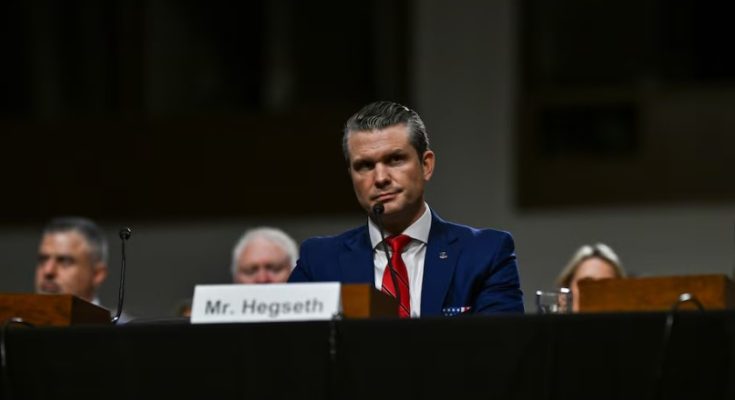Awkward exchanges about the defense secretary hopeful’s past were plentiful as Democrats went after the first embattled Trump pick to face a confirmation hearing.
Below are some takeaways from the hearing.
1. Sen. Kaine laid a few gloves on Hegseth
The most memorable part of the hearing on Tuesday is likely to be a tense exchange between Hegseth and Sen. Tim Kaine (D-Virginia).
Kaine was the first senator to ask tough questions about parts of Hegseth’s past that have dogged him, including affairs and allegations of sexual assault, alcohol abuse and financial mismanagement. Kaine wound up laying some gloves on Hegseth, who strained to talk around the subjects the senator was broaching.
Kaine started by asking Hegseth whether he was still married to his second wife when he had a 2017 sexual encounter that the woman claimed was assault. Hegseth said only, “I believe so,” despite the timeline being clear and Hegseth having acknowledged the encounter. (He says it did occur but was consensual.) At another point, Hegseth struggled to respond when Kaine asked him to restate that the encounter was consensual, clearly not wanting to talk about it.
The two engaged in a long dance in which Kaine focused mostly on Hegseth’s infidelity — Hegseth has also previously acknowledged cheating on his first wife and fathered a child in 2017 from another affair — but Hegseth repeatedly concentrated on denying the assault allegations.
Hegseth soon pointed to his 7-year-old daughter from the latter affair, calling her “a child of God.”
“And you cheated on the mother of that child less than two months after she was born, didn’t you?” Kaine asked.
“Those charges were false,” Hegseth responded, as if the question was about the assault.
It proceeded like that, with Kaine arguing that these episodes called Hegseth’s judgment into question, and Hegseth claiming he was cleared of assault. (In fact, not being charged with a crime is not the same as being “cleared.”)
As the exchange wore on, Hegseth declined to address a Washington Post report that he hadn’t fully disclosed the alleged sexual assault to Trump’s transition team. He also refused to say whether actually committing such a sexual assault or abusing a spouse would be disqualifying for the job. In both cases, he merely said he had not done those things.
“If you, as a leader, are not capable of saying that physical violence against a spouse should be a disqualifying fact for being secretary of the most powerful nation in the world, you’re demonstrating an astonishing lack of judgment,” Kaine said.
Sen. Markwayne Mullin (R-Oklahoma) later downplayed the relevance of Hegseth’s extramarital affairs.
“You guys make sure you make a big show and point out the hypocrisy, because a man’s made a mistake,” Mullin said. “And you want to sit there and say that he’s not qualified. Give me a [break]. It is so ridiculous that you guys hold yourself as this higher standard. You forget you got a big plank in your eye.”
2. Hegseth tried to massage his past opposition to women in combat
A major subplot of Hegseth’s confirmation process is his shifting position on women in combat roles in the U.S. military.
He had said for years that women shouldn’t serve in combat. But he recently walked that back after meeting with Sen. Joni Ernst (R-Iowa), a combat veteran who initially balked at his selection. Ernst and multiple Democrats on the committee broached the subject at the hearing.
Hegseth tried to suggest that he hadn’t flip-flopped on the issue but that he had long been focused on “standards.”
“I very much appreciate you bringing up my comments from 2013 because for me, this issue has always been about standards,” he said.
Hegseth added: “Senator, the concerns I have and the concerns many have had, especially in ground combat units, is that in pursuit of certain percentages or quotas, standards have been changed.”
But Hegseth’s past comments didn’t distinguish women who meet certain standards from other women; he said women shouldn’t serve in combat, period. As recently as November — shortly before Trump picked him — he said, “I’m straight up just saying we should not have women in combat roles.”
Sen. Elizabeth Warren (D-Massachusetts) suggested Hegseth had conveniently changed his position to win confirmation — and could just as quickly change it back after being confirmed.
“You know, I’ve heard of deathbed conversions,” Warren said. “But this is the first time I’ve heard of a nomination conversion.”
3. Democrats suggested Hegseth is being protected from scrutiny
Democrats made a point throughout the hearing to suggest that Hegseth and Republicans were trying to avoid tough questions.
They repeatedly noted that Hegseth hadn’t met with Democrats on the Armed Services Committee, despite their requests.
They also pushed repeatedly for a second round of questions, which Chairman Roger Wicker (R-Mississippi) denied.
“That has been the custom,” ranking Democrat Jack Reed (Rhode Island) said, pointing to Democratic presidents’ defense secretary nominees. “Sen. [Chuck] Hagel was afforded three rounds. Ash Carter, two rounds. And that was done by a Republican chairman with the consent and the appropriate guidance of Democrats. I must say, to my recollection, I’ve never denied anyone the opportunity to ask the second round of questions.”
Wicker responded that the committee was following the precedent set by Defense Secretary Lloyd Austin’s 2021 confirmation hearing. But Republicans didn’t resist Austin’s nomination like Democrats are resisting Hegseth’s; only two of them voted against Austin.
4. Hegseth avoided terrible moments, but his confirmation hangs in the balance
A major question heading into Tuesday was how Hegseth would acquit himself.
His personal baggage is well-established, so there was a premium on soothing concerns, especially among a handful of GOP senators he will need to win confirmation. (Republicans have a 53-47 majority.) And while he’s accustomed to being on TV as a former Fox News host, submitting to a grilling under penalty of perjury is a different ballgame. Hegseth also lacks the traditional experience of a defense secretary pick.
He largely avoided a game-changing moment, even as his nomination is still somewhat in doubt.
Hegseth was clearly uncomfortable at times, but he mostly kept to his talking points, and made a clear and largely successful effort to say the kinds of things that will make it hard for GOP senators to vote against him. He hewed to Trump’s criticisms of the “woke” military and focused like a laser on military readiness and warfighting.
When the subjects turned sensitive, he largely talked around them and avoided the questions. Sometimes that was awkward, and it was clear what Hegseth was doing — such as when he declined to tell Sen. Mark Kelly (D-Arizona) whether specific allegations against him were true or false, as Kelly implored him to, and instead repeatedly just called them “anonymous smears.”
But the name of the game when your party has the majority is avoiding a really bad moment.
About the closest Hegseth came to that was when Sen. Tammy Duckworth (D-Illinois) tripped up Hegseth by quizzing him about international security arrangements and which countries are in the Association of Southeast Asian Nations (ASEAN). Hegseth responded to the latter question by naming allies — South Korea, Japan and Australia — that aren’t in the ASEAN bloc.
Hegseth also had a strong moment when Sen. Rick Scott (R-Florida) asked him what drove him to want the job. Hegseth laughed when Wicker told him he had just 30 seconds to answer that question.
“Because I love my country, senator, and I’ve dedicated my life to the warfighters,” Hegseth said. “People see me as someone who hosts a morning show on television, but people that really know me know where my heart’s at; it’s with the guys in this audience who’ve had my back, and I’ve had theirs. We’ve been in some of the darkest and most difficult places you can ever be in. You come back a different person, and only by the grace of God am I here before you today. I’m doing this job for them, all of them.”
All of that said, it’s not totally clear the math is there for Hegseth. Several GOP senators have kept their powder dry on committing to back him. Sen. John Curtis (R-Utah) told Politico he remained undecided Tuesday morning. Ernst didn’t signal support for Hegseth at the hearing.
If four of them oppose him, his nomination would be defeated.



